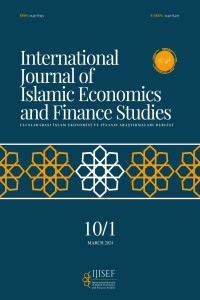Research Article
Issue Editorial Board

Heterodoks İktisat, Finansal Ekonomi, Politik Ekonomi

İslam Ekonomisi, Bölgesel Ekonomi, Uluslararası İktisat, Uluslararası İktisadi Kuruluşlar, Uluslararası İktisatta Bölgesel Gelişme ve Küreselleşme, İslam Finansı

Siyaset Bilimi, Anayasa ve Siyasal Kurumlar, Türk Siyasal Hayatı

İslam Hukuku

İslam Ekonomisi, İslam Finansı, İslami Mikrofinans

Assoc. Prof. Dr. Hakan KALKAVAN
İSTANBUL MEDENİYET ÜNİVERSİTESİ, SİYASAL BİLGİLER FAKÜLTESİ, İKTİSAT BÖLÜMÜ
 0000-0003-4482-0505
0000-0003-4482-0505
 0000-0003-4482-0505
0000-0003-4482-0505
Ekonomi Politik Teorisi, İslam Ekonomisi, İktisadi Düşünceler, Ekoloji, Sürdürülebilirlik ve Enerji, İktisat Sosyolojisi
Aim & Scope
International Journal of Islamic Economics and Finance Studies (IJISEF) started its publication in 2015. It publishes twice a year in March and September. International Journal of Islamic Economics and Finance Studies (IJISEF), which is an academic journal, accepts research articles and book reviews. Turkish and English articles are included in the journal.
International Journal of Islamic Economics and Finance Studies (IJISEF) is an international, academic, periodical and double blind peer-reviewed journal published by Centre of Political Economic and Social Research (PESA) in collaboration with Research Center for Islamic Economics and Finance (RECISEF).
Articles submitted for publication should be original, contributing to knowledge and scientific information in related fields or bringing forth new views and perspectives on previously written scholarly papers. Articles should not have been previously published or accepted for publication elsewhere. In addition, in order to avoid plagiarism, all articles are screened for plagiarism with the iThenticate program.
The journal accepts interdisciplinary and multidisciplinary scientific researches. In this context, it aims to create a platform to share, discuss, evaluate and disseminate the work and opinions of academicians, market actors and those interested in Islamic economics and finance research.
The Journal particularly focuses on topics related to: Islamic Economics, Islamic Banking, Islamic Financial Markets, Islamic Management, Fiqh Muamalat, Islamic Insurance (Takaful), Islamic Accounting, Islamic Business, Islamic Wealth Management, Islamic Financial Institutions, Islamic Economic Thought, History of Islamic Economics, Zakat and Waqf.
Author Guidelines
Attention should be paid to presenting the articles submitted to International Journal of Islamic Economics and Finance Studies (IJISEF) as follows. If a condition that does not comply with the following rules is detected during the pre-check phase, the article is returned to the author without being sent to the referees, and is requested to be framed by the following rules:
1. All papers must include an abstract of no more than 200 words. If the article is written in Turkish, there should be also a title and abstract of the article in English. It is strongly advised that the length of the article should not exceed 9000 words including references and footnotes. In addition, in Turkish articles, an Extended Abstract with a minimum of 700 words and a maximum of 1000 words should be written and added to the end of the study.
2. All papers must include minimum 3, maximum 6 keywords and minimum 1 JEL code. (JEL codes)
3. Referencing must follow APA Style (APA Style Sixth Edition)
4. Margins are as follows:
Paper Size: A4
• Top : 2.5 cm
• Bottom : 2.5 cm
• Left : 2.5 cm
• Right : 2.5 cm
• Gutter : 0”
• Gutter Position : Left
5. Title page:
a. Paper title 14pt, bold and centered
b. First letter of all words are capital
6. Author’s name on the title page:
a. First letter of name and surname are capital, e.g. Hakan Aslan
b. Centered
c. Author’s info (title, affiliation, email address ve Orcid number) in the footnote on the title page, left aligned and 10pt
7. Abstract, keywords, jel codes and the main text of the paper:
Main text:
a. Palatino Linotype font, 11pt, justified
b. Paragrafh spacing: before and after 6pt, line spacing: 1,15
Abstract, keywords, jel codes:
a. Palatino Linotype font, 10pt, justified
b. Paragrafh spacing: before and after 6pt, line spacing: 1,15
8. Heading
a. Left aligned, title case, numbered (excluding introduction, results and references), bold
b. Main headings and subheadings must numbered as follows: 1, 1.1, 1.1.1,…
9. Table, figure, graph, exhibit or chart: e.g. Table 1: Style Guide for Authors
a. Numbered
b. Above the table, figure, graph…
c. Bold, e.g: Graph 1:
d. Title case
10. References must be written alphabetically according to the surname of the author.
11. Illustrations, pictures and graphs, should be supplied with highest quality and in an electronic format that helps us to publish your article in the best way possible.
12. Papers should not include headers, footers and page numbers.
Ethical Principles and Publication Policy
Publication Ethics and Malpractice Statement
Ethical Principles and Publication Policy
International Journal of Islamic Economics and Finance Studies (IJISEF) respects the Code of Ethics for protecting the rights of its authors, the journal, and science. As part of publication processes, it involves producing, developing, and sharing information scientifically. By using the scientific method, peer-reviewed articles strive for the greatest degree of objectivity. It is essential that all stakeholders of the publication process, including editors, writers, publishers, referees, and readers, adhere to ethical standards at the point of scientific production. According to the publication ethics and open access policy of the International Journal of Islamic Economics and Finance Studies, all components of the publication process must adhere to ethical principles within the framework of the "Higher Education Institutions Scientific Research and Publication Ethics Directive" and the "Committee on Publication Ethics (COPE)". Click here for detailed information.
International Journal of Islamic Economics and Finance Studies (IJISEF) respects the Code of Ethics for protecting the rights of its authors, the journal, and science. In this stage, all parties involved in the publication process (authors, researchers, reviewers, editors) must adhere to the ethical principles. The parties must follow the following ethical rules within this framework:
Author’s Responsibilities:
• It has been significant that all authors contributed to the research,
• There should be no plagiarism or fraudulent data in the article; all data should be real and authentic;
• Publishing - or sending for publication - the same work in more than one journal is forbidden,
• References should be listed in the bibliography,
• It is important to follow the spelling rules when citing and bibliographing,
• A study should not have a similarity rate higher than 20%,
• It is important that academic studies do not conflict with publishing ethics,
• In the case of a mistake, all authors are obliged to retract or correct it,
• These rules are assumed to be adhered to by the authors.
IN ACCORDANCE WITH ARTICLE IV OF THE SCIENTIFIC RESEARCH AND PUBLICATION ETHICS DIRECTIVE OF HIGHER EDUCATION INSTITUTIONS, THESE ACTIONS CAN BE TAKEN:
• Plagiarism: Presenting someone else's ideas, methods, data, or works as your own, in whole or in part, without attribution according to scientific guidelines,
• Fraud: Using false or misleading data used in scientific research,
• Distortion: To falsify research records or data obtained, to present devices or materials that were not used in the research as if they were, or to alter or modify the results of the research in order to suit the interests of those who receive funds,
• Republishing: Presenting repetitive publications separately in academic appointments and promotions,
• Slicing: Publishing a research's results in more than one issue as separate publications in academic appointments and promotions, violating the integrity of research, and publishing the research in multiple journals.
• Unfair authorship: Including people who do not have active contributions among the authors or not including those who do, changing the order of authors in an unjustified and inappropriate manner, removing the names of contributors who actively contributed from subsequent editions, including their names in the authors by using their influence, even though they did not contribute actively.
Other types of ethical violations include:
• Not mentioning the individuals, institutions, or organizations that support them in publications resulting from research done with support.
• To use thesis or studies that have not yet been presented, defended and accepted as sources without permission,
• Without the author's express permission, share information from a work assigned for review with others before it is published,
• Misusing the scientific research resources, places, facilities, and devices provided or allocated,
• To allege unfounded and deliberate violations of ethical standards,
• To publish the results of surveys or attitude studies conducted within the scope of a scientific study without obtaining the explicit consent of respondents, or, if the research will take place in an institution, without the permission of the institution.
• Having failed to obtain written permissions from authorized units before conducting research or experiments,
• Conducting research or experiments in contrary to Turkey's legislation or international conventions concerning relevant research and experiments,
• To not use the data or information obtained from other persons or institutions in scientific studies to the extent and in the manner permitted, to not maintain confidentiality and not to protect this information,
• To make false or misleading statements in academic appointments or promotions regarding scientific research and publications.
Reviewers’ Responsibilities:
• Reporting the shortcomings and contributions of articles should be a priority for reviewers;
• It is important that they do not violate the confidentiality of the articles,
• It is important to make objective reviews.
• It is important for reviewers not to have any conflict of interest concerning the research, the authors, or the funders.
Editorial Responsibilities:
• Editors are responsible for rejecting or accepting articles,
• Editors should not have conflicts of interest in the articles they reject or accept,
• Accept only articles that will contribute to the field,
• They should promote the publication of a correction or retraction when errors are found,
• They should protect the anonymity of reviewers and prevent plagiarism and fraud.
For actions contrary to scientific research and publication ethics, see: “Higher Education Institutions Scientific Research and Publication Ethics Directive, Article 4 (Yükseköğretim Kurumları Bilimsel Araştırma ve Yayın Etiği Yönergesi, Madde 4)”. For more information, please click on the link.
Determination of the Situation Contrary to Publication Ethics
The International Journal of Islamic Economics and Finance Studies (IJISEF) uses a double-blind review process by at least two reviewers. Furthermore, all articles are checked by a program to detect publication ethics violations.
In the event that a reader notices an error or an inaccuracy in a paper published in the International Journal of Islamic Economics and Finance Studies (IJISEF) or has any other complaints about editorial content (plagiarism, duplicate papers, etc.), they should contact erhanakkas@sakarya.edu.tr. Complaints provide us with an opportunity to improve, and we aim to respond quickly and constructively.
Studies submitted to our journal include interviews, surveys, focus group work, experiments, etc. An "Ethics Committee Approval Certificate" must be obtained from the Ethics Committee of the relevant institution before the application can be submitted if the data are to be collected in different ways and used for scientific purposes, and the article content or an appendix must include information regarding ethics committee approval. If the ethics committee approval document is not received at the preliminary examination phase, the publication is returned to the author.
Relationships
Relations with the Reader
Editors should consider the knowledge, skills, and experience expectations of readers, researchers, and practitioners. Published studies should contribute to the reader, researcher, practitioner, and scientific literature and be original. Furthermore, the editor is required to take into account reader, researcher, and practitioner feedback and to provide informative and explanatory responses.
Relations with Authors
Editors are responsible for the following duties towards authors:
• Editors should consider importance, originality, validity, clarity of the narrative, and the aims and objectives of the journal before making a decision.
• Studies suitable for publication should proceed to the preliminary evaluation stage unless there is a serious problem.
• Unless there are serious problems with the study, the editor should not ignore positive referee suggestions.
• Unless there is a serious problem, the new editor should not change the previous editor's decisions regarding the studies.
• The authors should be notified and returned in an informative manner.
Relations with Referees
Editor's duties and responsibilities towards referees are as follows:
• Referees should be chosen according to the study's subject.
• Providing the referees with information and guides during the evaluation process.
• It has to consider whether the authors and the referees are in conflict of interest.
• It is important to keep referees' identities confidential when using blind refereeing practices.
• Ensure that a wide range of reviews is included in the referee pool, and that this pool is dynamically updated.
• A rude and unscientific evaluation should be prevented.
Editorial and Blind Review Processes
Editor; must follow the blind refereeing and evaluation process outlined in the journal's publication policies. In this context, the editor ensures that each work is evaluated in a fair, impartial, and timely manner.
Quality assurance
The editor is responsible for publishing all articles according to the journal's publication policies.
Principles Regarding Possible Malpractice Claims and Prevention Against Malpractice
• Editors are responsible for taking measures against potential abuse and misconduct. In order to identify and evaluate complaints regarding this situation, the editor must carry out an objective, meticulous investigation.
• The International Journal of Islamic Economics and Finance Studies adopts COPE's guidelines for handling allegations of misconduct. Consequently, the journal defines in details the responsibilities of the publisher, editors, reviewers, the Scientific Board and authors before, during, and after the publication process in Publication Ethics.
• When an article is submitted to several publishers, it is possible to compare versions of a single work submitted to numerous journals and to understand the explanations of authors and enquirers regarding the article, thereby cooperating and making an effort when there is suspected misconduct and violation, and acting in accordance with the inquiry/author's and/or the institution's policies.
• The International Journal of Islamic Economics and Finance Studies shares author and reviewer information only in order to prevent suspected misconduct and fulfill the obligation to handle such cases, given the significance of confidentiality in the scientific publication process.
• It is the responsibility of journal editors and field editors to investigate suspected cases before sharing such information with other parties. Consequently, sharing information only becomes an issue when the author fails to respond, provides an incomplete explanation, or the misconduct allegation affects more than one journal at the same time.
• When necessary, such information is only shared with editors considered knowledgeable about the subject, and the shared information is restricted to factual content only.
• The editors and field editors guarantee to protect the confidentiality of communication as much as possible.
Copyright Regulation and Conflict of Interest Policy
• The International Journal of Islamic Economics and Finance Studies considers that possible conflicts of interest among its stakeholders are detrimental to scientific publication ethics. The journal defines its obligations for all its stakeholders in order to detect and prevent conflicts of interest.
• Authors submitting to International Journal of Islamic Economics and Finance Studies agree to the copyright release terms.
Ensuring Academic Publication Integrity
It is the editor's responsibility to ensure that the reviews containing errors, inconsistencies or misdirection in the studies are quickly corrected.
Constructivism and Openness to Discussion
Editor;
• He/she should take into account persuasive criticisms of the works published in the journal and adopt a constructive attitude toward them.
• Authors of criticized works should be allowed to respond.
• It is important not to ignore or exclude studies with negative results.
Complaints
Editor; The author is obliged to carefully examine the complaints from the referees or readers and respond in an enlightening and explanatory manner.
Political and Commercial Concerns
The journal owner, publisher and no other political or commercial factors affect the editors' independent decision making.
Publication Policies
1. International Journal of Islamic Economics and Finance Studies (IJISEF) aims to contribute to the knowledge of Islamic economics by publishing studies with scientific qualifications at national and international level.
2. International Journal of Islamic Economics and Finance Studies (IJISEF) is a journal that uses a double-blind peer-review and publishes three times a year, march, july and november.
3. The publication language of the journal is Turkish and English.
4. The articles to be published in the journal should be original and academic works prepared using research methods suitable for their fields. In addition, book evaluations that contribute to the scientific field are accepted.
5. Submissions sent to the journal have been scanned via a plagiarism software, Ithenticate. Then, if any plagiarism is found, the submission is rejected without sending it to referees.
6. Articles submitted to the Journal should be unpublished elsewhere or be unsent for publication.
7. Articles are examined primarily for compliance with the writing rules. Submissions that are found not to comply with the publication and writing principles are returned to the author for necessary corrections without reviewing the content.
8. The articles submitted to the Journal for publication will be sent to referees who are experts of the subject determined by the Editorial Board after the preliminary examination. With two positive referee reports, to publish the article is decided. If the two referees express negative opinion, the article will not be published. When there are positive and negative referee reports for the same article, the article will be sent to a third referee.
9. If the expression "can be published after corrections" is chosen by referees, the article will be returned to the author for necessary corrections. After the corrections, the article is re-evaluated to check whether referees' warnings are taken into consideration.
10. The recommendations, criticisms and corrections of the referees are sent to the author by hiding the name of the referee.
11. All scientific and legal responsibilities of the published works belong to the author or authors.
12. A maximum of one work of the same author can be published in the same issue.
13. No royalties are paid to the author for published articles.
14. All publication rights of the articles accepted for publication belong to the Center of Political Economic and Social Research (PESA).
Price Policy
The services provided by IJISEF are free of charge. Author(s) do not need to make any payment for submission, processing and publishing their paper(s) in the IJISEF.
All articles published on IJISEF are licensed under the Creative Commons Attribution 4.0 International License. This license grants you the right to reproduce, share and disseminate data mining applications, search engines, websites, blogs, and all other platforms, provided that all published articles, data sets, graphics and attachments are cited. Open access is an approach that facilitates interdisciplinary communication and encourages different disciplines to work with each other.

